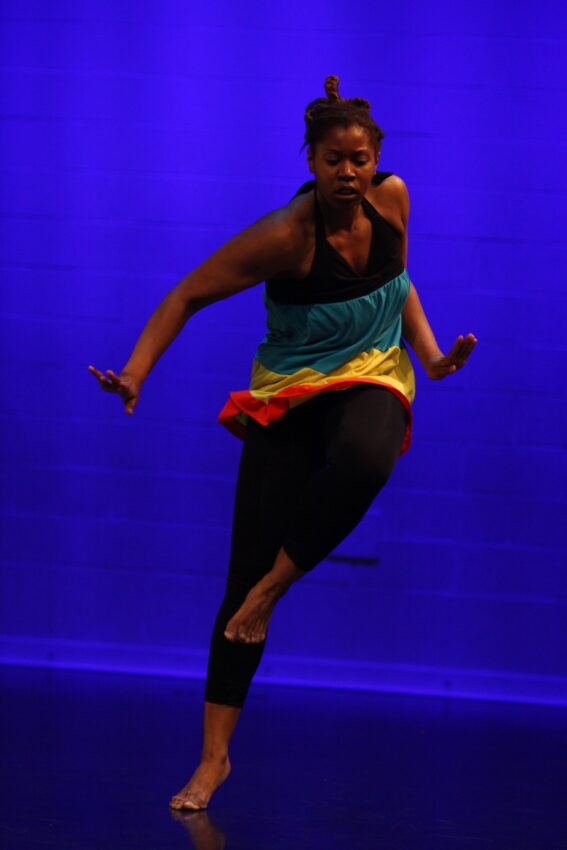Got the ‘Moves’…

They take the idea of mentoring seriously at Harlem Stage. Their annual E-Moves series, which takes place over the next two weekends, matches up developing choreographers with more veteran artists. “We pair the mentors with the artists, and we really leave it to them to establish a relationship—which we hope goes beyond the E-Moves experience,” says Brad Learmonth, Harlem Stage’s director of programming, who established E-Moves, now in its 12th year. “We aim to find a good match of choreographers. So that in each case they complement and learn from each other.”
The younger artists, identified as “emerging” or “evolving” depending on where they are in their careers, get a prominent showcase for their choreography as well as a crucial learning process. Each of the two E-Moves programs includes short works (10 minutes maximum) by four emerging artists in its first half, with the second half given over to an evolving dancemaker.
Those in the emerging category are in their first years as dance makers. Learmonth describes the “evolving” category as “people who have taken that step from emerging to being able to sustain 45 minutes of work. We felt that Johari Mayfield and Brandon Albright, two artists we’ve worked with several times in the past, had really taken that leap. Brandon’s been doing a lot of touring, and got real acclaim for his work last year at DanceAfrica. And we knew that Johari was working on a substantial piece with significant support, not only from us but from HERE.”
E-Moves was created as “a dance series that introduced emerging artists of color who were pushing the boundaries, in a showcase that displayed different forms,” Learmonth explains. And while its format has changed over the years, the overall focus has been consistent: “We always try to strike a balance. We try to have diversity in the mix, both culturally and form-wise. We always try to have some tap, some hip-hop and then a variety of contemporary dance. We always are on the lookout for movement that comes out of ballet. We try to find things that will push some buttons [and] bring something new to our audiences.”
The connection between the emerging/evolving choreographers and their mentors is a crucial component of E-Moves. This year’s mentors include Ronald K. Brown, Nora Chipaumire, Francesca Harper, Reggie Wilson, Janet Wong and Kevin Wynn. For the first time, the mentoring assignments are one-on-one; in the past, E-Moves assigned several choreographers to each mentor.
Chipaumire, a powerful performer who is a former member of Urban Bush Women and now presents her own work, is mentoring Marguerite Hemmings. Chipaumire rebelled against the standard concept of the mentor’s role. “Most people think of mentorship as somebody comes to look at your work, gives you feedback, and that’s it. When E-Moves asked me to mentor last year, I told them that what I’m interested in is how one artist on a different level with another could have a relationship over a period of time in which the conversations are not just about what that artist is working on right then and there, but what the overall long-term goals are. How can we both push each other to grow and develop? I think knowing what’s driving someone to be making dances at all is more important than whether this one piece she’s working on becomes a success or not. Of course everybody wants to make a successful piece, but how do you arrive at making a successful piece?”
Hemmings, whom she first mentored for last year’s E-Moves, graduated from Columbia University but wasn’t a dance major. “She’s mostly invested in hip-hop, which isn’t my language that I use. The challenge has been to provoke her into thinking deeply about what she wants to make. She can ask me questions whenever she has them. She sends me information, mostly written, about what her intentions are, and how she’s going about accumulating the raw material, the research or the people and how all that is developing. Then I read her material and ask questions, if something is unclear to me.
“I’m intrigued by her,” she says of Hemmings. “She’s a very smart, intellectual, talented young lady who hasn’t studied dance in the traditional way.” In her mentor’s role, Chipaumire impressed on the younger choreographer the importance of “the research and the rigor that you put in your body every day, regardless whether you have a performance coming up or not. The rehearsal process, the building process, is as rigorous energy-wise as the performance.”
Harlem Stage tends to nurture and sustain artists through various stages of their career. Kyle Abraham, once an E-Moves “emerging” participant, will be presented there in a new work next year. And the Hemmings-Chipaumire connection has yielded further dividends: Hemmings will be in the cast of Visible, a world premiere collaboration between Jawole Willa Jo Zollar and Chipaumire, premiering next fall at Harlem Stage.
E-Moves 12
Apr. 8 & 9, 15 & 16, Harlem Stage Gatehouse, 150 Convent Ave. (at W. 135th St.), 212-281-9240; 7:30, $20.
